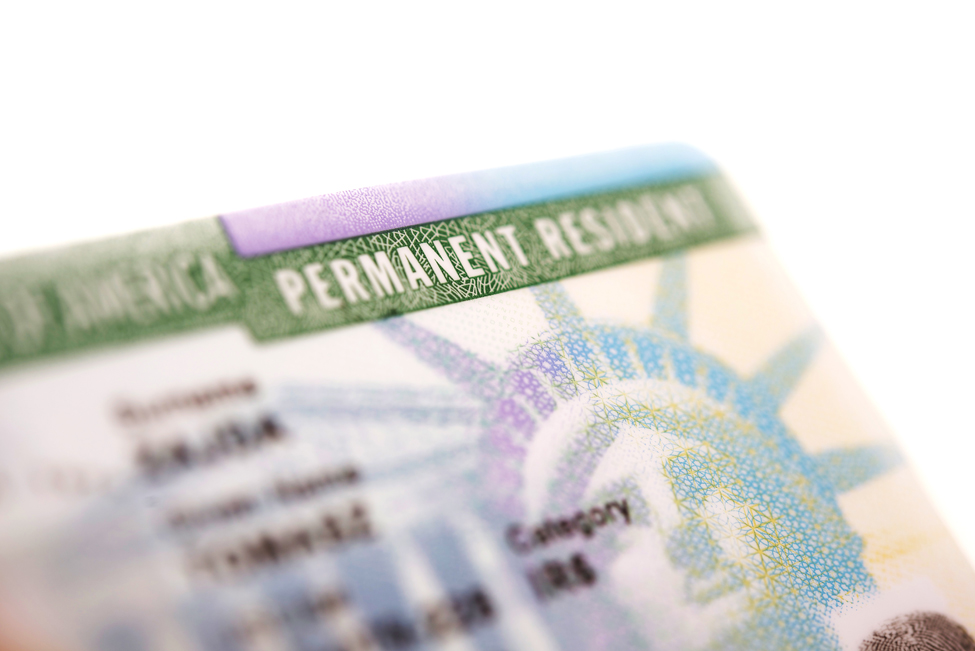There are quite a few differences before “adjusting status” and “consular processing.” First of all, it is impossible to “adjust status” outside of the U.S. Similarly, it is impossible to “consular process” in the United States.
Other differences include the amount of filing fees that will be paid, which government entities will be involved in the process, where the interview will occur, and when the green card will be received.
Let’s begin by discussing Adjustment of Status (AOS). AOS is the process where an individual obtains lawful permanent resident (LPR) status while in the U.S.
To qualify to adjust status, the following requirements must be met:
- Must be physically present in the United States
- Must have been “Inspected and Admitted”
- Must maintain lawful status at all times while in the U.S. (except for immediate relatives, battered spouses and children, and special immigrants as defined by the regulations)
- A visa number must be available (for all preference-based categories, if visa numbers regress after filing and no visa number is available, the case will be put on hold until a visa is available)
- Must not have a communicable disease
- Must be “Admissible”
- Application must not be “Abandoned”
- No adverse factors
Even if an applicant proves the first 7 bullet points, USCIS has the discretion to deny the green card application. Factors that could result in a denial could be: preconceived intent to immigrate at the time of entering as a nonimmigrant and repeated violations of immigration law.
[gdlr_accordion style=”style-1″ initial=”1″]
[gdlr_tab title=”What is the Process for Adjustment of Status?”]
File the forms and fees with USCIS. A receipt notice will be issued followed by a biometrics appointment for the applicant (if this is an Adam Walsh case, the petitioner will also be issued a biometrics appointment). All adjustment of status applicants must undergo IBIS and FBI security/name check. Before USCIS used to approve the green card application if the name check was not completed within 180 days, but this is no longer the case. Within 90 days of filing the Employment Authorization Document (EAD) will be issued (if the form has been filed). A few months later, an interview notice will be sent.
Overall, the processing time is an average of 5 months. If the initial filing is insufficient, a Request for Evidence may be issued at any time prior to the interview, and in rare occasions, after the interview. The 5-month timeframe will be extended by the amount of time for you to submit a response and for USCIS to resume processing of the application. If you have received a Request for Evidence, please contact us.
Now let’s compare the above to “consular processing.” Consular processing is the process where an individual obtains an immigrant visa from a U.S. Consulate in a foreign country. Upon the individual’s entry into the U.S., they will become a permanent resident of the U.S.
To qualify to adjust status, the following requirements must be met:
- Must have an immigrant petition (e.g. I-130 or I-140) approved
- Must be outside of the U.S. or travel outside of the U.S.
- A visa number must be available
- Must not have a communicable disease
- Must be “Admissible”
- No adverse factors
[/gdlr_tab]
[gdlr_tab title=”What is the Process for Consular Processing?”]
The approved immigrant petition is forwarded to the National Visa Center (NVC) which performs all pre-interview functions. Within 30 days of its receipt from USCIS, NVC issues a case number and sends the immigrant visa fee bill and affidavit of support fee bill to the attorney of record via email. Once the fees have been paid, the document list can be downloaded.
File the immigrant visa application online. Submit supporting documentation (e.g. passport, police certificate from country of nationality and country of resident at time of visa application where applicant has resided for six months or more, a police certificate from any other country where applicant resided for a year or more, certified copies of final dispositions, certified copy of birth record, documents establishing relationship to spouse and children, identity documents, medical exam and IRS tax returns). Once all of the supporting documentation has been submitted to the NVC, it will forward the file to the appropriate consular post and an appointment (interview) letter is issued. This letter contains the date the applicant must appear at the consulate and instructions for the medical exam.
The Dept. of State will check the applicant’s name of criminal activity through the National Crime Information Center’s Interstate Identification Index (NCIC). Department of Homeland Security will get involved in certain cases. Consular Officer will conduct the interview. Rather than deny a visa under INA §221(g), a Consular Officer may return the petition to Dept. of Homeland Security to request reconsideration and revocation. For consular processing cases initiated in the U.S., petitions that are being returned to USCIS for revocation are first sent to NVC by the consular post. Denials at consular posts cannot be reviewed by a court; the only relief is to seek an advisory opinion on a legal issue from Visa Office Advisory Opinions Division. If you are in this situation, please contact us. [/gdlr_tab]
[gdlr_tab title=”I Have a Straightforward Case. Why Would I Want to Hire an Attorney?”]
- Adjustment of Status: At the adjustment of status interview, we: 1) give our clients a thorough guide; 2) give our clients sample questions; and 3) attend the interview where we take diligent notes of all Questions and Answers. This allows us to address any issues should a Request for Evidence be issued, and also provides future clients with the most recently asked questions.
- Adjustment of Status: At the time we are retained, we provide the client with a detailed list of items. We prepare the adjustment of status application (and work authorization, and travel document) within 24 hours. If a client already has their medical exam in-hand and provides the requested items, we can send the petition out the same or next day. Since we request certain documents at the outset and submit a thorough petition, we avoid RFEs. This allows us to obtain approvals in an efficient and effective manner.
- Adjustment of Status: Many times clients file immigrant petitions on their own and then receive a Request for Evidence (RFE). The most common issues are that the couple is not cohabitating (living together) or there is not enough evidence to prove a “bona fide” relationship. The maximum timeframe to submit a response to an RFE is 84 days (87 if the notice is mailed). During this time, we review the initial filing and the RFE to determine the best type of evidence to submit. Since we handle complex matters, our specialty is providing documents supported by a legal memorandum that (together) convince USCIS to approve our case.
- Consular Processing: At the time we are retained, we provide the client with a list of items that NVC will want. By the time we receive notice from NVC that an immigrant visa number is available, we pay the fees online, complete the relevant forms within 24 hours, and obtain the items from the client (who already has them in-hand).
- Consular Processing: Through our experience, we know exactly what documents NVC and the U.S. Consulate will require. In our experience, NVC’s turnaround time is 30 days or less. Since we provide detailed lists to our clients well in advance of NVC’s correspondence, by the time NVC assigns a case number, the client has already provided all of the documents that we need to submit to NVC and we are able to submit our filing to NVC either the same or next day. Within 30 days, the NVC schedules the interview date. This streamline procedure is how we make record-time.
[/gdlr_tab]
[gdlr_tab title=”I Am Married to a U.S. Citizen but I Entered the U.S. Illegally. Am I Eligible to Adjust Status?”]
Yes, but only in two (2) circumstances: 1) if the individual has been subsequently paroled into the U.S. (e.g. using Advance Parole or Parole in Place); or 2) the individual is eligible for §245(i). If neither of these situations apply, the individual will be required to file a waiver of inadmissibility (either Form I-601 or I-601A). Once the waiver is approved, the foreign national must leave the U.S. to attend a consular interview. This could take weeks (if I-601A is filed) or years (if I-601 is filed). [/gdlr_tab]
[gdlr_tab title=”I Am Married to a Lawful Permanent Resident. I Would Like to Adjust Status. What Should I Be Worried About?”]
Since you are married to an LPR instead of a U.S. citizen, you must prove that you maintained lawful status and did not work without authorization. For parents, spouses, and children (under 21 years of age) of U.S. citizens, any unlawful presence and unauthorized employment is waived as a matter of discretion.
However, for parents, spouses, and children (under 21 years of age) of LPRs (and all other preference-based categories), you must prove that you maintained lawful status at all times while in the U.S. All green card applicants of preference-based categories who do not maintain lawful presence (except through no fault of their own or for technical reasons) will be required to file a waiver of inadmissibility unless they qualify for §245(i). [/gdlr_tab]
[gdlr_tab title=”I Have an Approved I-130. Can I Work or Travel Internationally?”]
No. Having an approved I-130 only allows you a basis to adjust status or consular process. It does not grant employment authorization, ability to obtain a driver’s license, to travel, or to obtain a social security number.
Even though you cannot work or travel, we encourage all eligible clients to apply for an I-130 for two reasons: first, in case ICE comes along, they can show them the receipt notice and most likely ICE will leave them alone; and 2) to get them “in line” for an immigrant visa. Taking one step towards becoming legal is better than not taking any steps. [/gdlr_tab]
[gdlr_tab title=”I Have Been Unlawfully Present in the U.S. I Have an Employer willing to File my Green Card. Am I Eligible to Adjust Status?”]
Maybe. Under INA §245(c)(7), a person may not adjust status through an employment-based petition if the person is not in lawful nonimmigrant visa status. There is a small exception in the law that allows an employment-based applicant who worked unlawfully or was out of status to adjust status as long as the unlawful presence or unauthorized employment was less than 180 days.
Moreover, any individual who was employed without authorization or has violated the terms of the nonimmigrant visa may not adjust status under INA §245(a). The only way around this is to prove: 1) that the violation was not the individual’s fault or occurred through technical reasons (described in the law); 2) a change/extension of status approval was rendered after the stay expired; or 3) reinstatement to student status on the basis of circumstances beyond the student’s control. [/gdlr_tab]
[gdlr_tab title=”I Am Applying for My Green Card. Can I Use My Income to Meet the Poverty Guidelines?”]
The law is clear on this point; if the applicant’s wages are earned from unauthorized employment, the income cannot be included on Form I-864, Affidavit of Support. This means that the applicant can only count income gained after being issued an Employment Authorization Document or employment authorization is incident to status (e.g. H-1B). [/gdlr_tab]
[gdlr_tab title=”I Arrived in the U.S. on ESTA (or on B-1/B-2 status) and I Want to Adjust Status. What Problems Can I Encounter?”]
The biggest problem that USCIS will examine is whether the you had fraudulent/preconceived intent to arrive in the U.S. under the guise of visiting, but all the while, had the intent of marrying your fiancé. Those who arrive on ESTA and wish to adjust status have two issues to overcome: first, the terms of ESTA bar the visitor from “filing to adjust status” or “filing to change to any other nonimmigrant status.” The one exception is for those who are marrying U.S. citizens. Second, ESTA visitors, like B-1/B-2 visitors must both prove to USCIS that they did not intend to get married at the time their visa was issued.
USCIS and the Department of State have both adopted what is called the “30/60/90- Day Rule.” It goes like this:
- If an alien files an immigration petition or applies for an adjustment of status within 30 days’ entry into the United States, the USCIS would likely find that the alien entered with “fraudulent intent” to remain in the U.S. and the non-immigrant visa would be classified as fraudulently obtained under the laws.
- If the alien applies for a change of status or adjustment of status after 30 days but before 60 days after entry, the USCIS could view the change or adjustment with an assumption that he/she had a “preconceived intent” to enter as a non-immigrant (downgraded to suspicion).
- If the adjustment of status application was filed more than 60 days after entry to the USA, the automatic presumption is that the applicant acted in good faith.
- There is no provision for 90 days; that is just a spoken recommendation made to some AOS filers so that they do not raise suspicions.
[/gdlr_tab]
[gdlr_tab title=”I Am Going to Consular Process. Can I Select a Consulate Different than the One Located Where I Reside?”]
Maybe. Generally, the designated consulate is the one in the place of last residence abroad (not the country of nationality). In other words, it will be in the country where the applicant’s “principal actual dwelling” is located. There are a couple of exceptions to this residence rule. First is if the applicant can prove “hardship” that would require a U.S. consulate in another country to handle the case. Second, if the applicant is “homeless” or “one who is a national of a country in which the U.S. has no consular representation or in which the political or security situation is tenuous or uncertain enough that the limited consular staff is not authorized to process immigrant visa applications.” [/gdlr_tab]
[gdlr_tab title=”My Spouse Did Not Show Up to My Green Card Interview. What Happens Now?”]
USCIS may deem an application abandoned where the applicant or U.S. citizen spouse fails to show up for a scheduled interview and did not receive a request by the applicant or the attorney of record to reschedule the date. If you are in this situation, please call us immediately. A denial for failure to appear for a marriage-based adjustment of status interview usually results in the issuance of a Notice to Appear (in Immigration Court) and institution of removal proceedings. [/gdlr_tab]
[gdlr_tab title=”I Married While in Removal Proceedings. What Can I Expect?”]
A person who marries a U.S. citizen while in removal proceedings must prove by “clear and convincing evidence” that the marriage was entered into in “good faith.” The green card process for those in removal proceedings is entirely different than for those who are not in removal proceedings. One main difference is that the green card application must be filed with the Immigration Court. If the applicant, who is in removal proceedings, files the green card application with USCIS, USCIS will accept the filing fees then will deny your case for “lack of jurisdiction.” This means that since you are in removal, the Immigration Court has control (“jurisdiction”) over your case. The only exception to this rule is for “arriving aliens.” [/gdlr_tab]
[gdlr_tab title=”Should I Choose Adjustment of Status or Consular Processing?”]
We can help you choose which option is best for your particular circumstances. There are pros and cons for each approach. There are also many considerations such as processing time, cost, intent to travel to the U.S. in the future, attorney representation at the interview, options if the case is denied. For example:
- Processing Time: In our experience, we find the processing time for both processes is similar (approximately 5 to 6 months). This is because we have procedures in place that streamline the process allowing us to file your cases within 24 hours.
- Cost: USCIS’ filing fees for adjustment of status ($1490); Consular Processing ($865).
- Future Travel: Adjustment of Status allows the person to travel in and out of the U.S. using Advance Parole; Consular Processing does not allow a person to travel to the U.S. on a nonimmigrant visa when an immigrant petition has been filed (except in rare circumstances).
- Attorney Representation: An attorney can represent a client in the Adjustment of Status Interview, but not at a Consular Interview.
- Options if the Case is Denied: For Adjustment of Status, the attorney can file a Motion to Reopen or Reconsider that contains legal precedent; For Consular Processing, an informal request to reconsider the denial can be made, but the consular officer has wide discretion and is under no legal obligation to approve the case. To ensure our clients can make an informed decision, we sit down with them and go over their specific set of facts. After we understand our client’s goals and timeframe, we explain the benefits, possible consequences and processing times for each process. When the client has decided which option is best, we provide the client with the relevant list of supporting documents.
We understand that clients are often anxious. To ease this anxiety, during every step of the process, we send emails with all USCIS correspondence attached (e.g. receipt notices, biometrics appointments, interview notices). The emails also contain information on what to expect, when to expect it, and how to prepare for the next few steps. Responsiveness, availability, and steady email communication ensures that clients are always updated, which keeps our clients calm and happy. [/gdlr_tab]
[/gdlr_accordion]
How We Can Help
- Prepare applications with prosecutorial discretion arguments
- Reopen old removal orders and have the charges dismissed on the basis of marriage to a U.S. citizen.
- Terminate ongoing removal proceedings on the basis of marriage to a U.S. citizen
- If you entered the U.S. without inspection, we can obtain Parole-in-Place or Advance Parole so you can be paroled into the U.S.
- Prepare §245(i) petitions in conjunction
- Address emergencies: e.g. during one adjustment of status interview, the officer lost the sealed medical exam. We were able to obtain a copy of the sealed medical exam the same day and drop it off without the issuance of a Request for Evidence. The case was approved the same day as the interview.
Contact Us
We offer a free case evaluation by phone. We are available Monday through Friday from 8:30 am to 8:00 pm and Saturday from 8:00 am to 12:00 pm. In-person consultations are by appointment only. Please call our office at 301.529.1912 or click here to contact us. Please be sure to provide a timeline of events along with details of your entire immigration history.










